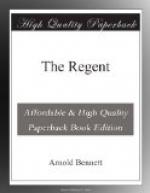Edward Henry, who had begun to feel sympathetic, was somewhat repelled by these odd last remarks. After all the man, though human enough, was an utter stranger.
“No thanks,” he said. “And so you’re going to put up a church here?”
“Yes.”
“Well, I wonder whether you are.”
He walked abruptly away under Alloyd’s riddling stare, and he could almost hear the man saying, “Well, he’s a queer lot, if you like.”
At the corner of the site, below the spot where his electric sign was to have been, he was stopped by a well-dressed middle-aged lady who bore a bundle of papers.
“Will you buy a paper for the cause?” she suggested in a pleasant, persuasive tone. “One penny.”
He obeyed, and she handed him a small blue-printed periodical of which the title was “Azure, the Organ of the New Thought Church.” He glanced at it, puzzled, and then at the middle-aged lady.
“Every penny of profit goes to the Church Building Fund,” she said, as if in defence of her action.
Edward Henry burst out laughing; but it was a nervous, half-hysterical laugh that he laughed.
II
In Carey Street, Lincoln’s Inn Fields, he descended from his brougham in front of the offices of Messrs Slosson, Hodge, Budge, Slosson, Maveringham, Slosson & Vulto—solicitors—known in the profession by the compendious abbreviation of Slossons. Edward Henry, having been a lawyer’s clerk some twenty-five years earlier, was aware of Slossons. Although on the strength of his youthful clerkship he claimed, and was admitted, to possess a very special knowledge of the law—enough to silence argument when his opponent did not happen to be an actual solicitor—he did not in truth possess a very special knowledge of the law—how should he, seeing that he had only been a practitioner of shorthand?—but the fame of Slossons he positively was acquainted with! He had even written letters to the mighty Slossons.
Every lawyer and lawyer’s clerk in the realm knew the greatness of Slossons, and crouched before it, and also, for the most part, impugned its righteousness with sneers. For Slossons acted for the ruling classes of England, who only get value for their money when they are buying something that they can see, smell, handle, or intimidate—such as a horse, a motor-car, a dog, or a lackey. Slossons, those crack solicitors, like the crack nerve specialists in Harley Street and the crack fortune-tellers in Bond Street, sold their invisible, inodorous and intangible wares of advice at double, treble, or decuple their worth, according to the psychology of the customer. They were great bullies. And they were, further, great money-lenders—on behalf of their wealthier clients. In obedience to a convenient theory that it is imprudent to leave money too long in one place, they were continually calling in mortgages, and re-lending the sums so collected on fresh investments, thus achieving two bills of costs on each transaction, and sometimes three, besides employing an army of valuers, surveyors and mortgage-insurance brokers. In short, Slossons had nothing to learn about the art of self-enrichment.




